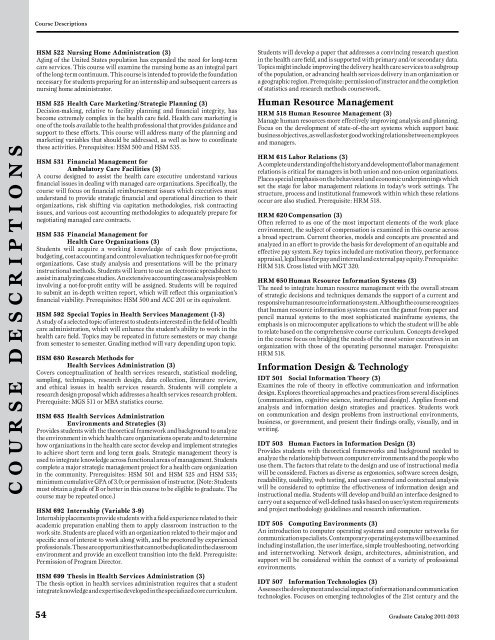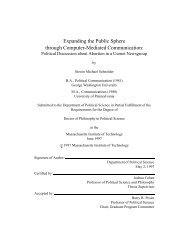Graduate Catalog 2011-2013 - SUNY Institute of Technology
Graduate Catalog 2011-2013 - SUNY Institute of Technology
Graduate Catalog 2011-2013 - SUNY Institute of Technology
You also want an ePaper? Increase the reach of your titles
YUMPU automatically turns print PDFs into web optimized ePapers that Google loves.
Course Descriptions<br />
COURSE DESCRIPTIONS<br />
HSM 522 Nursing Home Administration (3)<br />
Aging <strong>of</strong> the United States population has expanded the need for long-term<br />
care services. This course will examine the nursing home as an integral part<br />
<strong>of</strong> the long-term continuum. This course is intended to provide the foundation<br />
necessary for students preparing for an internship and subsequent careers as<br />
nursing home administrator.<br />
HSM 525 Health Care Marketing/Strategic Planning (3)<br />
Decision-making, relative to facility planning and financial integrity, has<br />
become extremely complex in the health care field. Health care marketing is<br />
one <strong>of</strong> the tools available to the health pr<strong>of</strong>essional that provides guidance and<br />
support to these efforts. This course will address many <strong>of</strong> the planning and<br />
marketing variables that should be addressed, as well as how to coordinate<br />
these activities. Prerequisites: HSM 500 and HSM 535.<br />
HSM 531 Financial Management for<br />
Ambulatory Care Facilities (3)<br />
A course designed to assist the health care executive understand various<br />
financial issues in dealing with managed care organizations. Specifically, the<br />
course will focus on financial reimbursement issues which executives must<br />
understand to provide strategic financial and operational direction to their<br />
organizations, risk shifting via capitation methodologies, risk contracting<br />
issues, and various cost accounting methodologies to adequately prepare for<br />
negotiating managed care contracts.<br />
HSM 535 Financial Management for<br />
Health Care Organizations (3)<br />
Students will acquire a working knowledge <strong>of</strong> cash flow projections,<br />
budgeting, cost accounting and control evaluation techniques for not-for-pr<strong>of</strong>it<br />
organizations. Case study analysis and presentations will be the primary<br />
instructional methods. Students will learn to use an electronic spreadsheet to<br />
assist in analyzing case studies. An extensive accounting case analysis problem<br />
involving a not-for-pr<strong>of</strong>it entity will be assigned. Students will be required<br />
to submit an in-depth written report, which will reflect this organization’s<br />
financial viability. Prerequisites: HSM 500 and ACC 201 or its equivalent.<br />
HSM 592 Special Topics in Health Services Management (1-3)<br />
A study <strong>of</strong> a selected topic <strong>of</strong> interest to students interested in the field <strong>of</strong> health<br />
care administration, which will enhance the student’s ability to work in the<br />
health care field. Topics may be repeated in future semesters or may change<br />
from semester to semester. Grading method will vary depending upon topic.<br />
HSM 680 Research Methods for<br />
Health Services Administration (3)<br />
Covers conceptualization <strong>of</strong> health services research, statistical modeling,<br />
sampling, techniques, research design, data collection, literature review,<br />
and ethical issues in health services research. Students will complete a<br />
research design proposal which addresses a health services research problem.<br />
Prerequisite: MGS 511 or MBA statistics course.<br />
HSM 685 Health Services Administration<br />
Environments and Strategies (3)<br />
Provides students with the theoretical framework and background to analyze<br />
the environment in which health care organizations operate and to determine<br />
how organizations in the health care sector develop and implement strategies<br />
to achieve short term and long term goals. Strategic management theory is<br />
used to integrate knowledge across functional areas <strong>of</strong> management. Students<br />
complete a major strategic management project for a health care organization<br />
in the community. Prerequisites: HSM 501 and HSM 525 and HSM 535;<br />
minimum cumulative GPA <strong>of</strong> 3.0; or permission <strong>of</strong> instructor. (Note: Students<br />
must obtain a grade <strong>of</strong> B or better in this course to be eligible to graduate. The<br />
course may be repeated once.)<br />
HSM 692 Internship (Variable 3-9)<br />
Internship placements provide students with a field experience related to their<br />
academic preparation enabling them to apply classroom instruction to the<br />
work site. Students are placed with an organization related to their major and<br />
specific area <strong>of</strong> interest to work along with, and be proctored by experienced<br />
pr<strong>of</strong>essionals. These are opportunities that cannot be duplicated in the classroom<br />
environment and provide an excellent transition into the field. Prerequisite:<br />
Permission <strong>of</strong> Program Director.<br />
HSM 699 Thesis in Health Services Administration (3)<br />
The thesis option in health services administration requires that a student<br />
integrate knowledge and expertise developed in the specialized core curriculum.<br />
Students will develop a paper that addresses a convincing research question<br />
in the health care field, and is supported with primary and/or secondary data.<br />
Topics might include improving the delivery health care services to a subgroup<br />
<strong>of</strong> the population, or advancing health services delivery in an organization or<br />
a geographic region. Prerequisite: permission <strong>of</strong> instructor and the completion<br />
<strong>of</strong> statistics and research methods coursework.<br />
Human Resource Management<br />
HRM 518 Human Resource Management (3)<br />
Manage human resources more effectively improving analysis and planning.<br />
Focus on the development <strong>of</strong> state-<strong>of</strong>–the-art systems which support basic<br />
business objectives, as well as foster good working relations between employees<br />
and managers.<br />
HRM 615 Labor Relations (3)<br />
A complete understanding <strong>of</strong> the history and development <strong>of</strong> labor management<br />
relations is critical for managers in both union and non-union organizations.<br />
Places special emphasis on the behavioral and economic underpinnings which<br />
set the stage for labor management relations in today’s work settings. The<br />
structure, process and institutional framework within which these relations<br />
occur are also studied. Prerequisite: HRM 518.<br />
HRM 620 Compensation (3)<br />
Often referred to as one <strong>of</strong> the most important elements <strong>of</strong> the work place<br />
environment, the subject <strong>of</strong> compensation is examined in this course across<br />
a broad spectrum. Current theories, models and concepts are presented and<br />
analyzed in an effort to provide the basis for development <strong>of</strong> an equitable and<br />
effective pay system. Key topics included are motivation theory, performance<br />
appraisal, legal bases for pay and internal and external pay equity. Prerequisite:<br />
HRM 518. Cross listed with MGT 320.<br />
HRM 650 Human Resource Information Systems (3)<br />
The need to integrate human resource management with the overall stream<br />
<strong>of</strong> strategic decisions and techniques demands the support <strong>of</strong> a current and<br />
responsive human resource information system. Although the course recognizes<br />
that human resource information systems can run the gamut from paper and<br />
pencil manual systems to the most sophisticated mainframe systems, the<br />
emphasis is on microcomputer applications to which the student will be able<br />
to relate based on the comprehensive course curriculum. Concepts developed<br />
in the course focus on bridging the needs <strong>of</strong> the most senior executives in an<br />
organization with those <strong>of</strong> the operating personnel manager. Prerequisite:<br />
HRM 518.<br />
Information Design & <strong>Technology</strong><br />
IDT 501 Social Information Theory (3)<br />
Examines the role <strong>of</strong> theory in effective communication and information<br />
design. Explores theoretical approaches and practices from several disciplines<br />
(communication, cognitive science, instructional design). Applies front-end<br />
analysis and information design strategies and practices. Students work<br />
on communication and design problems from instructional environments,<br />
business, or government, and present their findings orally, visually, and in<br />
writing.<br />
IDT 503 Human Factors in Information Design (3)<br />
Provides students with theoretical frameworks and background needed to<br />
analyze the relationship between computer environments and the people who<br />
use them. The factors that relate to the design and use <strong>of</strong> instructional media<br />
will be considered. Factors as diverse as ergonomics, s<strong>of</strong>tware screen design,<br />
readability, usability, web testing, and user-centered and contextual analysis<br />
will be considered to optimize the effectiveness <strong>of</strong> information design and<br />
instructional media. Students will develop and build an interface designed to<br />
carry out a sequence <strong>of</strong> well-defined tasks based on user/system requirements<br />
and project methodology guidelines and research information.<br />
IDT 505 Computing Environments (3)<br />
An introduction to computer operating systems and computer networks for<br />
communication specialists. Contemporary operating systems will be examined<br />
including installation, the user interface, simple troubleshooting, networking<br />
and internetworking. Network design, architectures, administration, and<br />
support will be considered within the context <strong>of</strong> a variety <strong>of</strong> pr<strong>of</strong>essional<br />
environments.<br />
IDT 507 Information Technologies (3)<br />
Assesses the development and social impact <strong>of</strong> information and communication<br />
technologies. Focuses on emerging technologies <strong>of</strong> the 21st century and the<br />
54 <strong>Graduate</strong> <strong>Catalog</strong> <strong>2011</strong>-<strong>2013</strong>
















